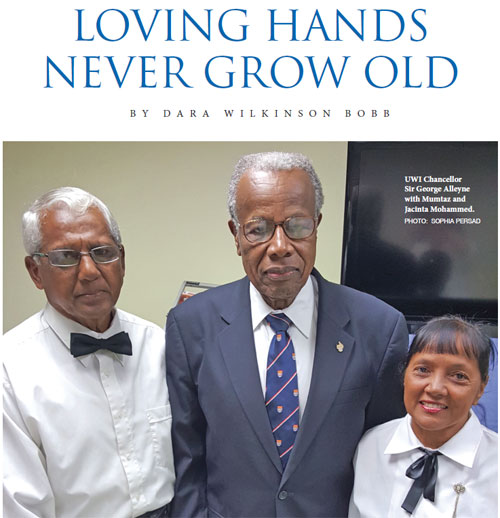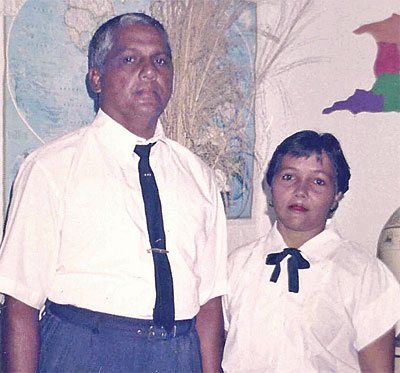
 They have fed and clothed hundreds of UWI graduates and officials for nearly 50 years, and it fills them with as much pride as when it all began in 1969. They have fed and clothed hundreds of UWI graduates and officials for nearly 50 years, and it fills them with as much pride as when it all began in 1969.
Mumtaz Mohammed and his wife, Jacinta, have witnessed the growth of The UWI, St. Augustine firsthand, watching the student population grow from a mere handful to almost 19,000 in 2015. Mr. Mumtaz and Mrs. Mumtaz, as they are fondly called, have worked at The UWI as food service attendants, a butler, and a robing assistant for graduation ceremonies for as long as most can remember.
When they first started, the graduation ceremony was held at the main library, which was one-third of the size of its current incarnation as the Alma Jordan Library. Mumtaz recalls that the site of the massive block of buildings housing the Engineering Faculty was just a pond. He is happy to have seen this growth and is pleased that many of the students from the early seventies are running the university.
Indeed, he remembers ‘college’ versions of St. Augustine Campus Principal Professor Clement Sankat, Professor Brian Copeland, former Minister Pamela Nicholson, Prime Minister of St. Lucia, Kenny Anthony, Professor Stephan Gift, Attorney Christo Gift, and Chief Justice Ivor Archie. As an attendant in the JFK cafeteria from 1969 to 1983, Mumtaz feels these individuals developed under his care, as he provided four hearty meals for them, and more, every day.
Our job is like this, he says: If your last child had dinner at eight and then said they wanted something more later, you wouldn’t refuse them.
“If, even after hours they said they wanted something, it was our responsibility to get it for them.”
In the seventies, the UWI offered meal plans to all students living on the hall, which were paid for by Caribbean governments as a part of a total package including tuition and lodging. Meals cost TT$7 a day (for four meals).
“Something better than Hilton,” says Mumtaz with a chuckle. “Eggs, buljol, cornbeef, sardines – full works.”
“For dinner,” says Jacinta, “beefsteak, whole big legs of chicken, veggie soup, pumpkin soup.”
Students, however, wanted the freedom and flexibility of having their money in hand. After negotiations from 1980 to 1983, he said the cafeteria unit was disbanded and meal services for the campus were given over to private enterprises. He was the only survivor.
Mumtaz recalls those early days clearly, smiling as he remembers a student from India who was a vegetarian. By the second year, he had tried a hard-boiled egg, and by the third, before he left, he was eating Trini-style baked chicken.
Mumtaz was also a butler. “The butler was the main caretaker. You are entrusted with the responsibility of the key to open the buildings by 6 am.”
 When asked how she felt about her husband working on these shifts, late at night with culinary duties or early in the morning with caretaker responsibilities, Jacinta was clear. When asked how she felt about her husband working on these shifts, late at night with culinary duties or early in the morning with caretaker responsibilities, Jacinta was clear.
“For me it was like sweetbread, because I did not have to get up in the morning to cook. They were entitled to breakfast. So all I had to do was make sure the children got off to school.”
She came on board at UWI in 1985 as a helper to her husband.
“I supported him right through,” she says. “Worked with him. But to say, take the spotlight? He was in the spotlight, I was in the shadow, and I was comfortable with that.”
She is referring to her role behind the counter or the bar while her husband attended to Chancellors and other officials. For graduation ceremonies, she was happy to assist as needed, for example, by pinning robes, while her husband had a more pivotal role. His role included making arrangements from the day before by providing a list of needs to the Principal’s Office, and arriving two hours before the graduation to greet the Chancellor, ensure that the food and drinks were well provided and set up, and that the dignitaries present were comfortable.
This requires a delicate balance and a certain temperament, he explains.
“You never go up front to them and mingle with them like a pal. They have their space, and only if you are invited then you approach… I have a responsibility to perform my duty in a certain manner at a certain distance, to serve the needs of the University and the guests.”
They both note, however, that they really appreciated how Chancellors, Vice-Chancellors and Principals would greet them warmly, hug them or shake their hands. Mumtaz remembers when the Queen of England visited for the opening of the new Engineering building. At the end of her visit she asked to address the staff of twelve persons and said, as Mumtaz remembers it, “I truly appreciate your kindness and the meals you have provided.” Then she nodded.
At the Graduation ceremony this year, Chancellor Sir George Alleyne publicly thanked them for their service.
“We really appreciated working with them and the support they have given us,” says Mumtaz. “It is always teamwork. The cleaner is just as important as the cook. We were a team… What I have learned in the kitchen – the cleaner, the cook, the butler, whoever you are – we are a chain. We need each other.”
Dara Wilkinson Bobb is a part-time assistant Lecturer in The Writing Centre, Faculty of Humanities and Education, UWI St. Augustine.
|





